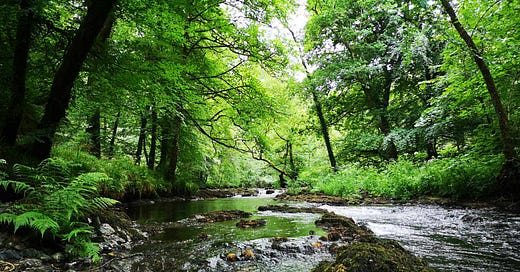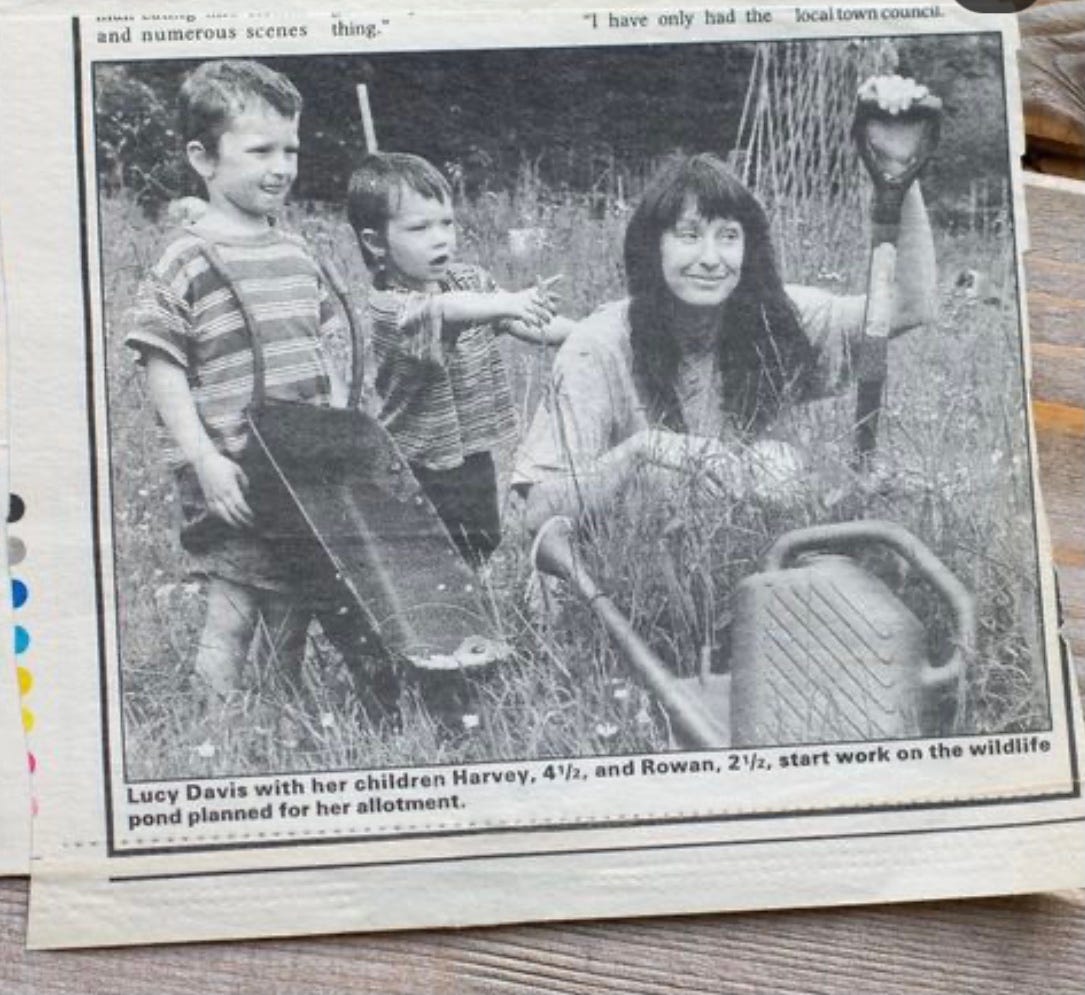Welcome to this weeks Slow Sunday.
Beauty
It’s been a week of changeable bright sunny and underwater weather. One early morning the sun was so bright in the blue sky, clear except for one dark rain cloud.
Walking up a hill I enjoyed stepping along the wet pavement, sounds of birds singing my ears alive. I walked for quite a while, head down, lost in all the different leaves. Some squashed into the pavement, wet, brown and copper; shining bright in the sun. Others, looking like they did a few weeks ago, flattened lemons and limes across the pavement and in the gutter. Some still on trees, falling down, ever so gently. Fluttering in the air, and that’s when I saw it. An incredible rainbow in the sky.
Huge it was, complete, and so clear. I just stood and stared, and then head up for the rest of my walk. The colours were soft but clear, you could almost see through them. The trees underneath were like firework displays, branches lit up by the sun. There were hardly any cars and I heard the birdsong all the way up the hill.
When I came back down the rainbow was gone and the sun hidden, as rain pattered onto the trees, leaves, and pavement. Cars swished past me. Bushes wet and glistening, a softness in the air as those gentle raindrops fell, and the light in the sky, made as if there was still a hint of sunshine across the city landscape.
When I got home the rain had stopped and the sun bright again. I stayed out and cleared huge bundles of fallen down leaves from the tree out front. Picked them up in my hands and stuffed them into recycling boxes. Then carried these round to the shared garden out back, and squished all those wet, damp, glistening leaves, into compost containers. I could feel their microbiome on my skin, and later on in the evening; I could still feel it.
I can write more about microbiomes another time, but for anyone who hasn’t heard of them, it’s all the little bacterial, micro-organisms and other unseen things, that create an eco-system upon which health depends—ours, the planet, plants and all the creatures.
The soil, water and air all have microbiomes that feed the microbiomes within and on us. In the soil, insects, fungi’s and the mycelium they consist of, are part of that eco-system. Chemical farming kills the microbiome off, which is why food is no longer nutrient dense, and the chemicals on that food kill off the microbiome in our gut, which is a big part of the reason why people have so many digestive complaints, inflammation and chronic diseases. That’s why I grew organically on my allotments— kids and I had two when they were growing up. I dug one allotment into fixed beds and the other I covered with cardboard and planted through, then turned that into fixed beds too—if you have lots of compost you can simply place it about 8 inches deep on top of cut grass to create your beds, or if you have lots of weeds, cut down then cover with cardboard and put the compost on top of that.
Once the beds are created you never walk on them, so the soil doesn’t get compacted. This means you don’t need to dig them, which lets the microbiome thrive—when we dig or plough we are breaking up this intricate and well-balanced eco-system, and it has to take time to reform. The healthiest food comes from this type of rich living soil.
Anyway, after I’d finished scooping up the wet leaves from the garden out front, I could feel my body filling up with that Microbiome, and my spirits lifted considerably. I wasn’t low exactly, but it’s a difficult time in the world.
Allotment heaven
When my kids and I had two allotments half the site stood empty—my sons are 32 and 34 now.
Harvey and Rowan had the benefit (not that they necessarily realised this when I dragged them over there no matter the weather) of spending lots of time outside, breathing in that microbiome (they rarely got ill, I had to give them health days off school to make up for their friends having sick days, when they were little). I have missed taking care of those pieces of land.
Well, a couple of weeks ago my neighbour leant me their allotment to grow on. And last week a community allotment project was given the go ahead to turn a field on some farmland just out from the centre of the city, into allotments, so I have put my name down for one there as well. I will be planting board beans, garlic, and shallots before November has gone.
I’ve really missed having contact with the soil and it’s microbiome mixing with mine, so I’m looking forward to having a little piece of the planet to take care of and grow food on again. This, is pure Sattva for the mind and body.
Joy dots
Living soil
Wet leaves
Scrunching leaves
Copper and gold leaves
Lemon and lime leaves
Tree branches blowing about
Wet tiled roofs
Still slow quiet Sunday morning
My sons
Friendship
Warmth, in all ways
Bright blue-skies on early autumn mornings
Dusk and birdsong
Hibernating
Sunday lunch
Recipe
A tiny Sunday chicken lunch
I made some of this pesto then I par boiled potatoes, took some out to roast, and continued cooking the others. Next I tenderised a chicken breast, skin on, with a little bashing. The potatoes were roasting as I fried this for one minute on each side with quite a high heat in butter, then turned the heat down, added a lid and poached in the butter for 10 minutes. This is when the rest of the potatoes were ready to mash and pop in the oven to get a crispy topping. I mashed them with butter, cream, black pepper and sea salt. I find that good quality salt and butter gives you a better taste—even on poor weeks when having to eat mostly rice, I always invest in good salt, butter and lemons, then everything tastes nice. Next I took the chicken off the heat to sit for ten minutes in the pan, lid on. Lastly I steamed some spinach and tossed in butter. And now for the best bit, I served and ate.
Rainforests in Britain
Dartmoor temperate rain forest, photo by Mark de Bernhardt Lane
I discovered recently that Britain has rainforests.
I remember on my gap years, when I was helping out at a project called Embercombe based in a Devon—I worked on a programme they ran at the time, taking young adults who had experienced tough lives into nature for a few days, and I took part in a leadership apprenticeship scheme which included a kitchen apprenticeship—well I remember the pockets of woodland on Dartmoor. Only they weren’t woodland they were rainforest!
As an apprentice, a group of us were taken to Dartmoor by Mark de Bernhardt Lane—the guy who took the photo above—who was our wild food and bushcraft teacher. We gathered what we needed to make fire and shelter and spent the night sleeping out in temperatures of -2 degrees. We dug a trench each side of the fire and spread out the embers to keep everyone warm. I was so hot even though cold temperatures of -2 degrees. This was a cold, wet, damp rainforest we were in, and so it was safe in these conditions to make the fire, of course that’s something you have to be really careful about and we wouldn’t have done it at any other time of year.
I wondered at the time why the oak trees were so knarled, and stunted, so short, with branches like corkscrews, plants growing on them and so much lichen, ferns and mosses covering everything; and then I discovered it was because Dartmoor is on the west side of Britain. Guy Shrubsole has written a great book I’m reading at the moment called The Lost Rainforests of Great Britain, in which he explains that temperate rainforests run up the whole of the West side of Britain—also known as Atlantic rainforests because that side of Britain faces the Atlantic ocean, and Celtic rainforests, because they were so revered by the Celts. There used to be 20% rainforest cover up that west side of the British Isles, reduced now to 13%, but still there, and Dartmoor is one of them. It’s to do with the weather conditions—a mix of humidity, high rainfall, warm winds and little temperature variation.
Dartmoor temperate rain forest, photo by Mark de Bernhardt Lane
Dartmoor temperate rain forest, photo by Mark de Bernhardt Lane
As I finish this Slow Sunday letter, a storm is gathering outside my windows, which are open because I’m enjoying listening to the wind roaring through the tree out front, in gusts, with children’s voices coming up from the street in between, and neighbours hurrying home or running to their cars, to swish along the streets creating jewels with their headlights on dark, wet, tarmac roads. Meanwhile me, I’m going to make some banana and pecan nut bread muffins, then dream of starry skies and the sound of owls, terwit terwooing.
I’d love to know what ordinary, simple things you have got up to today, perhaps you’ll tell me in the comments.
Wishing you the Warmest,
Lucy x











Thank you for this, Lucy. It’s really interesting learning more about the microbiome. Makes me want to drop everything & get out into the garden! The highlight of my Sunday was trying a walk on the other side of my new village, just before dark. A place I haven’t visited since childhood, so I want sure how to find it... It became a beautiful bear hunt, with a wrong turn taking me over a stone stile & through colourful grassland, until eventually I found the woodland. The trees were all so colourful & beautiful. I was speechless. In the middle stood a majestic beech tree, who I immediately recognised as a grandmother & greeted as such. It was a wonderful. Xx
Love this Lucy! It's so rich in texture and sensory wonderment, and so evocative of English autumns as I sit here in Auckland with spring creeping towards summer. West Auckland is something of a rainforest too. I love the dense, luscious, sub-tropical greenery and dramatic landscapes, though some days my body complains loudly about the damp and humidity! My simple things today also include getting out into my garden, getting my hands in the dirt, clearing weeds and preparing for some planting. Thanks for the reminder about the gift this is to our microbiome 😊💚